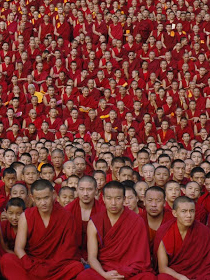- Home
- FPMT Homepage
Foundation for the Preservation of the Mahayana Tradition
The FPMT is an organization devoted to preserving and spreading Mahayana Buddhism worldwide by creating opportunities to listen, reflect, meditate, practice and actualize the unmistaken teachings of the Buddha and based on that experience spreading the Dharma to sentient beings. We provide integrated education through which people’s minds and hearts can be transformed into their highest potential for the benefit of others, inspired by an attitude of universal responsibility and service. We are committed to creating harmonious environments and helping all beings develop their full potential of infinite wisdom and compassion. Our organization is based on the Buddhist tradition of Lama Tsongkhapa of Tibet as taught to us by our founders Lama Thubten Yeshe and Lama Thubten Zopa Rinpoche.
- Willkommen
Die Stiftung zur Erhaltung der Mahayana Tradition (FPMT) ist eine Organisation, die sich weltweit für die Erhaltung und Verbreitung des Mahayana-Buddhismus einsetzt, indem sie Möglichkeiten schafft, den makellosen Lehren des Buddha zuzuhören, über sie zur reflektieren und zu meditieren und auf der Grundlage dieser Erfahrung das Dharma unter den Lebewesen zu verbreiten.
Wir bieten integrierte Schulungswege an, durch denen der Geist und das Herz der Menschen in ihr höchstes Potential verwandelt werden zum Wohl der anderen – inspiriert durch eine Haltung der universellen Verantwortung und dem Wunsch zu dienen. Wir haben uns verpflichtet, harmonische Umgebungen zu schaffen und allen Wesen zu helfen, ihr volles Potenzial unendlicher Weisheit und grenzenlosen Mitgefühls zu verwirklichen.
Unsere Organisation basiert auf der buddhistischen Tradition von Lama Tsongkhapa von Tibet, so wie sie uns von unseren Gründern Lama Thubten Yeshe und Lama Thubten Zopa Rinpoche gelehrt wird.
- Bienvenidos
La Fundación para la preservación de la tradición Mahayana (FPMT) es una organización que se dedica a preservar y difundir el budismo Mahayana en todo el mundo, creando oportunidades para escuchar, reflexionar, meditar, practicar y actualizar las enseñanzas inconfundibles de Buda y en base a esa experiencia difundir el Dharma a los seres.
Proporcionamos una educación integrada a través de la cual las mentes y los corazones de las personas se pueden transformar en su mayor potencial para el beneficio de los demás, inspirados por una actitud de responsabilidad y servicio universales. Estamos comprometidos a crear ambientes armoniosos y ayudar a todos los seres a desarrollar todo su potencial de infinita sabiduría y compasión.
Nuestra organización se basa en la tradición budista de Lama Tsongkhapa del Tíbet como nos lo enseñaron nuestros fundadores Lama Thubten Yeshe y Lama Zopa Rinpoche.
A continuación puede ver una lista de los centros y sus páginas web en su lengua preferida.
- Bienvenue
L’organisation de la FPMT a pour vocation la préservation et la diffusion du bouddhisme du mahayana dans le monde entier. Elle offre l’opportunité d’écouter, de réfléchir, de méditer, de pratiquer et de réaliser les enseignements excellents du Bouddha, pour ensuite transmettre le Dharma à tous les êtres. Nous proposons une formation intégrée grâce à laquelle le cœur et l’esprit de chacun peuvent accomplir leur potentiel le plus élevé pour le bien d’autrui, inspirés par le sens du service et une responsabilité universelle. Nous nous engageons à créer un environnement harmonieux et à aider tous les êtres à épanouir leur potentiel illimité de compassion et de sagesse. Notre organisation s’appuie sur la tradition guéloukpa de Lama Tsongkhapa du Tibet, telle qu’elle a été enseignée par nos fondateurs Lama Thoubtèn Yéshé et Lama Zopa Rinpoché.
Visitez le site de notre Editions Mahayana pour les traductions, conseils et nouvelles du Bureau international en français.
Voici une liste de centres et de leurs sites dans votre langue préférée
- Benvenuto
L’FPMT è un organizzazione il cui scopo è preservare e diffondere il Buddhismo Mahayana nel mondo, creando occasioni di ascolto, riflessione, meditazione e pratica dei perfetti insegnamenti del Buddha, al fine di attualizzare e diffondere il Dharma fra tutti gli esseri senzienti.
Offriamo un’educazione integrata, che può trasformare la mente e i cuori delle persone nel loro massimo potenziale, per il beneficio di tutti gli esseri, ispirati da un’attitudine di responsabilità universale e di servizio.
Il nostro obiettivo è quello di creare contesti armoniosi e aiutare tutti gli esseri a sviluppare in modo completo le proprie potenzialità di infinita saggezza e compassione.
La nostra organizzazione si basa sulla tradizione buddhista di Lama Tsongkhapa del Tibet, così come ci è stata insegnata dai nostri fondatori Lama Thubten Yeshe e Lama Zopa Rinpoche.
Di seguito potete trovare un elenco dei centri e dei loro siti nella lingua da voi prescelta.
- 欢迎 / 歡迎
简体中文
“护持大乘法脉基金会”( 英文简称:FPMT。全名:Foundation for the Preservation of the Mahayana Tradition) 是一个致力于护持和弘扬大乘佛法的国际佛教组织。我们提供听闻,思维,禅修,修行和实证佛陀无误教法的机会,以便让一切众生都能够享受佛法的指引和滋润。
我们全力创造和谐融洽的环境, 为人们提供解行并重的完整佛法教育,以便启发内在的环宇悲心及责任心,并开发内心所蕴藏的巨大潜能 — 无限的智慧与悲心 — 以便利益和服务一切有情。
FPMT的创办人是图腾耶喜喇嘛和喇嘛梭巴仁波切。我们所修习的是由两位上师所教导的,西藏喀巴大师的佛法传承。
繁體中文
護持大乘法脈基金會”( 英文簡稱:FPMT。全名:Found
ation for the Preservation of the Mahayana Tradition ) 是一個致力於護持和弘揚大乘佛法的國際佛教組織。我們提供聽聞, 思維,禪修,修行和實證佛陀無誤教法的機會,以便讓一切眾生都能 夠享受佛法的指引和滋潤。 我們全力創造和諧融洽的環境,
為人們提供解行並重的完整佛法教育,以便啟發內在的環宇悲心及責 任心,並開發內心所蘊藏的巨大潛能 — 無限的智慧與悲心 – – 以便利益和服務一切有情。 FPMT的創辦人是圖騰耶喜喇嘛和喇嘛梭巴仁波切。
我們所修習的是由兩位上師所教導的,西藏喀巴大師的佛法傳承。 察看道场信息:
- FPMT Homepage
- News/Media
-
- Study & Practice
-
-
- About FPMT Education Services
- Latest News
- Programs
- New to Buddhism?
- Buddhist Mind Science: Activating Your Potential
- Heart Advice for Death and Dying
- Discovering Buddhism
- Living in the Path
- Exploring Buddhism
- FPMT Basic Program
- FPMT Masters Program
- FPMT In-Depth Meditation Training
- Maitripa College
- Lotsawa Rinchen Zangpo Translator Program
- Universal Education for Compassion & Wisdom
- Online Learning Center
-
- Prayers & Practice Materials
- Overview of Prayers & Practices
- Full Catalogue of Prayers & Practice Materials
- Explore Popular Topics
- Benefiting Animals
- Chenrezig Resources
- Death & Dying Resources
- Lama Chopa (Guru Puja)
- Lama Zopa Rinpoche: Compendium of Precious Instructions
- Lama Zopa Rinpoche: Life Practice Advice
- Lama Zopa Rinpoche Practice Series
- Lamrim Resources
- Mantras
- Prayer Book Updates
- Purification Practices
- Sutras
- Thought Transformation (Lojong)
- Audio Materials
- Dharma Dates - Tibetan Calendar
- Translation Services
- Publishing Services
- Ways to Offer Support
- Prayers & Practice Materials
-
- Teachings and Advice
- Find Teachings and Advice
- Lama Zopa Rinpoche Advice Page
- Lama Zopa Rinpoche: Compendium of Precious Instructions
- Lama Zopa Rinpoche Video Teachings
- ༧སྐྱབས་རྗེ་བཟོད་པ་རིན་པོ་ཆེ་མཆོག་ནས་སྩལ་བའི་བཀའ་སློབ་བརྙན་འཕྲིན།
- Podcasts
- Lama Yeshe Wisdom Archive
- Buddhism FAQ
- Dharma for Young People
- Resources on Holy Objects
- Teachings and Advice
-
-
*If a menu item has a submenu clicking once will expand the menu clicking twice will open the page.
-
-
- Centers
-
- Teachers
-
- Projects
-
-
-
-
*If a menu item has a submenu clicking once will expand the menu clicking twice will open the page.
-
-
- FPMT
-
-
-
-
-
The minute you cherish others, you have happiness and peace in your life.
Lama Zopa Rinpoche
-
-
-
- Shop
-
-
-
The Foundation Store is FPMT’s online shop and features a vast selection of Buddhist study and practice materials written or recommended by our lineage gurus. These items include homestudy programs, prayers and practices in PDF or eBook format, materials for children, and other resources to support practitioners.
Items displayed in the shop are made available for Dharma practice and educational purposes, and never for the purpose of profiting from their sale. Please read FPMT Foundation Store Policy Regarding Dharma Items for more information.
-
-
Advice from Lama Zopa Rinpoche
5
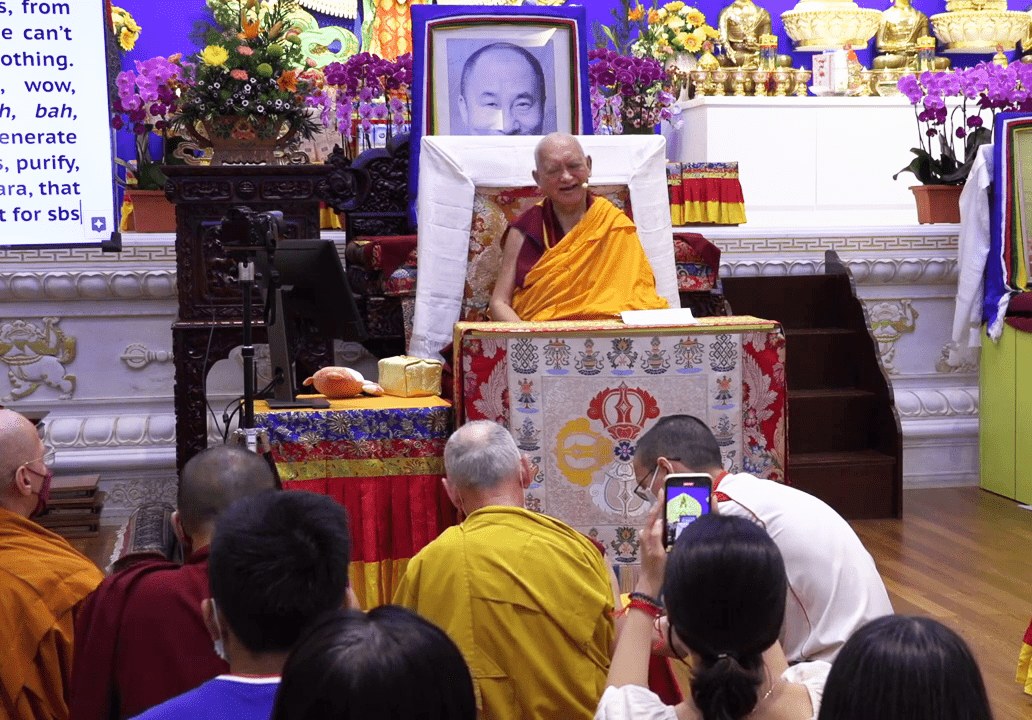
Lama Zopa Rinpoche giving thought transformation teachings at Amitabha Buddhist Centre, Singapore, September 3, 2022.
Lama Zopa Rinpoche continued his video teachings on thought transformation from Amitabha Buddhist Centre in Singapore in August and September. Here is a summary of the teaching offered on September 3, 2022:
For those of us living as a couple in relationships, we need to practice having a good heart. With body, speech, and mind, we have incredible opportunities to collect good karma. If we dedicate our own lives to serving others, to create happiness and reduce suffering in others, then we influence our companions to gradually do the same. This is really offering so much help to them, helping them to be free from samsara and attain enlightenment more quickly. Even if not thinking about enlightenment, even if not Buddhist, it is still very logical to practice a good heart because it brings so much happiness to others.
Rinpoche offers the oral transmission of Lama Tsongkhapa’s thought transformation teaching, Utilizing Suffering in the Path to Enlightenment at 1:13:44 in the video.
At the end of this teaching, Rinpoche also shared some advice offered to a geshe in Singapore who contracted Covid-19. Rinpoche requested that copies of this advice be made available so that those who receive it will, “enjoy the most and be most happy.” This full advice is available to all.
We invite you to go deeper into the topics presented here, plus many others, by watching Rinpoche’s video below and reading the full transcript of Rinpoche’s teaching.
Watch Lama Zopa Rinpoche’s teaching “In Your Life as a Couple, Practice Good Heart”:
- Read the transcript of Rinpoche’s teaching.
- Find Rinpoche’s Teachings on Thought Transformation translated into various languages.
- Dedication verses
Summary of Lama Zopa Rinpoche’s teaching by Carina Rumrill based on the rough transcript by Ven. Joan Nicell with editorial input and additions by Justin Jenkins. This summary is meant to highlight key topics presented by Rinpoche in the recorded video and is not intended to serve as a full representation of Rinpoche’s teaching, which is best received through watching the video and/or reading the full transcript which we will make available once completed.
Watch more from the video series Lama Zopa Rinpoche’s Teachings on Thought Transformation and find links to videos in transcripts, MP3s, additional practice advice, and more:
https://fpmt.org/fpmt/announcements/resources-for-coronavirus-pandemic/advice-from-lama-zopa-rinpoche-for-coronavirus/
You can listen to this teaching on our full-length-teachings podcast as well:
https://fpmt.org/media/podcasts/
Lama Zopa Rinpoche is the spiritual director of the Foundation for the Preservation of Mahayana Tradition (FPMT), a Tibetan Buddhist organization dedicated to the transmission of the Mahayana Buddhist tradition and values worldwide through teaching, meditation and community service.
- Tagged: advice from lama zopa rinpoche, coronavirus, lama zopa rinpoche thought transformation video teaching, video
4
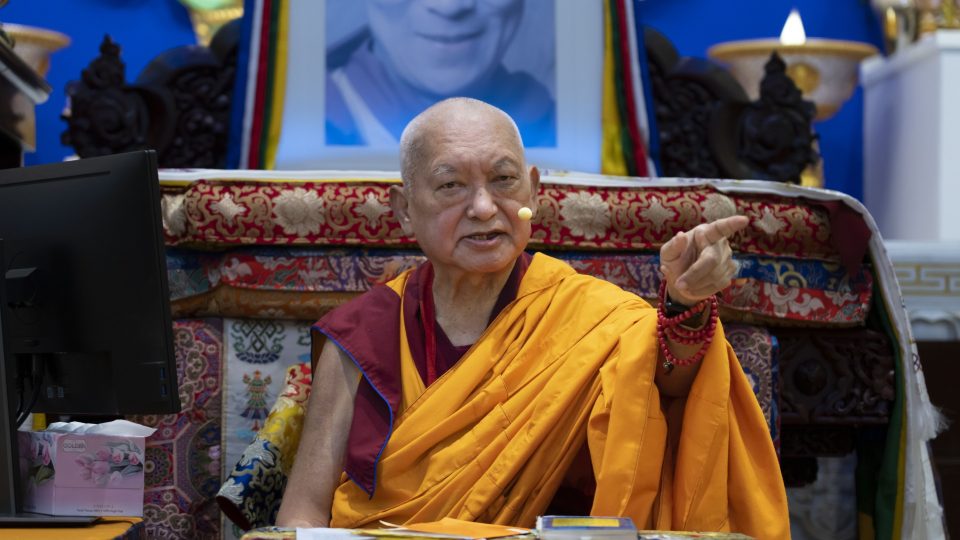
Lama Zopa Rinpoche teaching at Amitabha Buddhist Centre, Singapore, August 2022. Photo by Ven. Lobsang Sherab.
Since the early days of the COVID pandemic, Lama Zopa Rinpoche has been offering teachings on thought transformation (lojong). In these teachings, Rinpoche has been urging us to use these difficult times, and any obstacles in life, on the path to enlightenment.
Recently, Rinpoche offered some advice to a geshe in Singapore who contracted COVID. Rinpoche shared this advice during his September 3, 2022 thought transformation teaching from Amitabha Buddhist Centre and requested that copies of this advice be made available so that those who receive it will, “enjoy the most and be most happy.” We will share a summary and video of this entire teaching in tomorrow’s blog.
While this advice was given to an advanced practitioner, in it we will all find inspiration for turning problems into opportunities to practice and rejoice.
My dear One,
So I heard this morning that you got COVID. You should think, “Woooow! I found a wish-granting jewel.” Diamonds and gold, are nothing, even skies of gold and diamonds, are not as precious. You getting COVID is more precious than skies of wish-granting jewels which don’t stop rebirth in the lower realms, don’t stop rebirth in samsara, cannot free you from samsara, cannot free you from lower nirvana, cannot bring you to enlightenment. So it is nothing.
But COVID destroys the self-cherishing thought making it possible to generate bodhicitta, then become free from samsara, free from the lower realms, and that is main cause to achieve enlightenment for sentient beings then liberate the numberless sentient beings from lower realms, from samsara, from lower nirvana. You bring all the sentient beings to enlightenment. It is unbelievable what COVID does for you, unbelievable benefit. You You should feel unbelievable, great happiness to have COVID.
Why? Because you can experience all sentient beings’ COVID now. You can experience and dedicate it. You can experience all the sentient beings’—numberless human beings, numberless hungry ghosts, numberless animals, numberless human beings, numberless suras, numberless asuras in different universes—you can experience all the numberless sentient beings’ COVID. You can experience and dedicate all the sentient beings’ COVID, all the suffering and causes, the negative karma and defilements, then let the sentient beings achieve enlightenment.
Choje Gotsangpa, a great Kagyu lama, advised:
“By me experiencing this, may sentient beings be free from all the sufferings, all the sicknesses, all causes, negative karma, due to that may sentient beings become enlightened.”
You can recite this as mantra like OṂ MAṆI PADME HŪṂ. You can recite this prayer, so incredibly precious. Because of this, then you can take all the sentient beings’ COVID, so, so precious. All the sufferings came from self-cherishing thought, given to you by self-cherishing thought. Self-cherishing thought caused you to suffer from beginningless rebirths.
Not only in the past, not only in the present, the self-cherishing thought continuously harms you in the future as long as you follow it. Not just harm for yourself, the numberless hell beings, hungry ghosts, animals, human beings, suras, asuras–you have been harming numberless sentient beings, with the self-cherishing thought! They have had to suffer from beginningless rebirths up to now. So much suffering. Then again in the future, due to the self-cherishing thought. So therefore, the self-cherishing thought is the main enemy, the main worst enemy in the world, in the life, not only for you, it is most harmful to numberless sentient beings, already harmed from beginningless rebirths now and in the future. So now this is the worst enemy.
So COVID is so important. It is given to you by the self-cherishing thought, now you give back. You experience all the sentient beings’ COVID, you give it back to the self-cherishing thought and the self-cherishing thought is eliminated. Every time, every time the self-cherishing thought is destroyed, eliminated, then with that then your root of your samsara, oceans of sufferings, ignorance, holding the I as real, I that appeared real and truly existing, then mind holding onto that, looking at that as real and true. The aggregates appear real from there, then holding that as true. That is ignorance. So all that is eliminated. Eliminated because the I, real I appearing there, is not there at all. What appeared from there is not there at all, so you see, totally empty. So stay there a little while, then you do giving. Ok, but mostly you spend time taking. That is great, great.
Then it makes you to do tonglen. Each time you take sentient beings’ suffering, each time you give away your body, possessions, and merits to numberless sentient beings, then you become closer to enlightenment, you collect more than skies of merits each time and you become closer and closer to enlightenment.
You are so lucky, so fortunate to get COVID, you should think that way, so rejoice. It is so good. “Oh, I got COVID!” Rejoice. Even if you die, by experiencing COVID for sentient beings, experiencing COVID with bodhicitta, then you don’t go to lower realms.
Actually bodhisattvas prefer to be reborn in the lower realms, in the hell, for the sake of even one sentient being, to liberate them from samsara, from the lower realms; they pray to be born in hell for even one sentient being, to liberate them from there. That is their great wish, stronger than even the arhats, who like the blissful state of peace for oneself. You understand?
So you see by experiencing for sentient beings, that is the power of a good heart. Then you never get reborn in the lower realms. Like the Kadampa geshe, Chekawa, always prayed to be born in the lower realms, but the day he was going to die, the appearance of pure land happened right away, around him, so he told his attendant he didn’t succeed, so now make offerings. So understand, you are so lucky, you should rejoice.
Thank you very much. I’m giving an example but like that you should do similar with all the obstacles. Like that. Thank you very much.
With much love and prayers,
Lama Zopa
Transcribed by Ven. Joan Nicell at Amitabha Buddhist Centre, Singapore, September 2, 2022. Lightly edited by Ven. Holly Ansett and further edited for publication by Carina Rumrill.
Lama Zopa Rinpoche is the spiritual director of the Foundation for the Preservation of Mahayana Tradition (FPMT), a Tibetan Buddhist organization dedicated to the transmission of the Mahayana Buddhist tradition and values worldwide through teaching, meditation, and community service.
Explore Lama Zopa Rinpoche’s teaching series on thought transformation and find links to videos in transcripts, MP3s, additional practice advice, and more:
https://fpmt.org/fpmt/announcements/resources-for-coronavirus-pandemic/advice-from-lama-zopa-rinpoche-for-coronavirus/
28
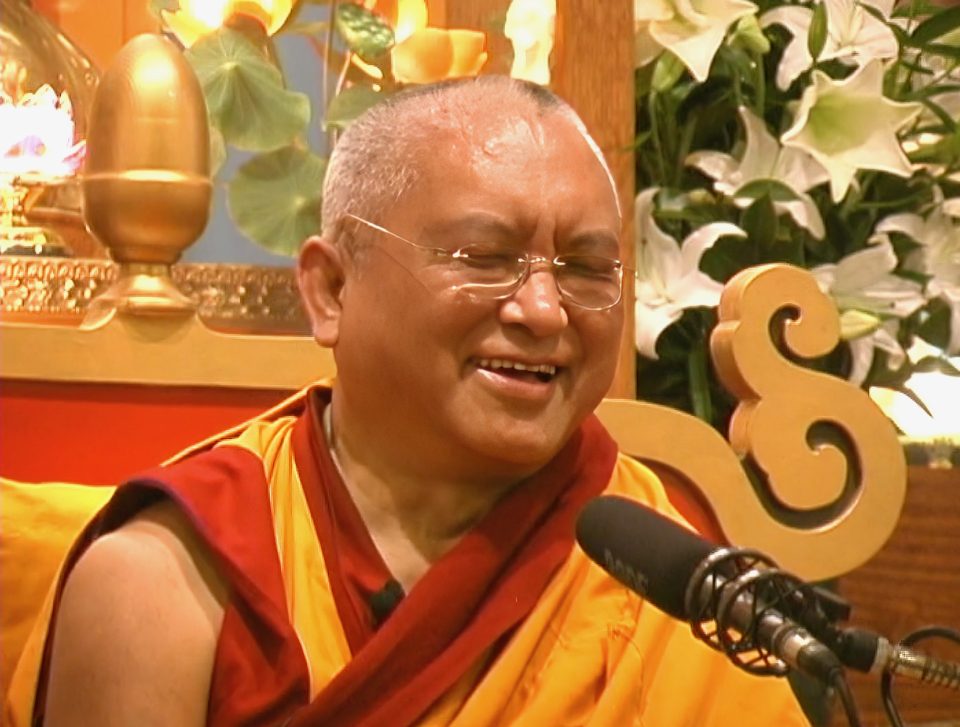
Lama Zopa Rinpoche teaching at Tara Institute, AUS, June 2, 2006.
In 2006, Lama Zopa Rinpoche offered a teaching at Tara Institute, AUS. We are pleased to offer this teaching in four parts, which has just been added to the FPMT website and the FPMT YouTube channel.
In the first video Rinpoche touched on topics such as emptiness according to the Svatantrika view, the unification of emptiness and dependent arising, and searching for the real I. He recounted the history of how Lama Atisha came to Tibet and how to integrate the three levels of teachings.
In the second video Rinpoche spoke on the importance of bodhicitta when following the Vajrayana, recounted the story of Dromtönpa realizing bodhicitta while serving Atisha, eliminating the root ignorance and achieving nirvana, and then explained how to use the verse “Like a star …” to meditate on emptiness and impermanence in daily life. He closed by returning to the subject of emptiness, analyzing how the I, aggregates such as form, head, atom or consciousness exist, as well as looking at the concept of true existence.
In the third video Rinpoche continued his analysis on how the I, aggregates such as form, head, atom or consciousness exist to illustrate the emptiness of the aggregates. He continues his elaboration on using the verse, “Like a star …” to deepen our understanding of emptiness and emphasizes to apply this in daily life and relationships. Answering the question of a student, Rinpoche then taught on the importance of guru devotion and bodhicitta, how to serve the guru, and the purpose of guru devotion.
In the fourth video, Rinpoche finished his explanation on the purpose of guru devotion and then extensively dedicated the merits of giving these teachings.
All of these videos as well as downloadable MP3 audio are available on the Rinpoche Available Now page.
21
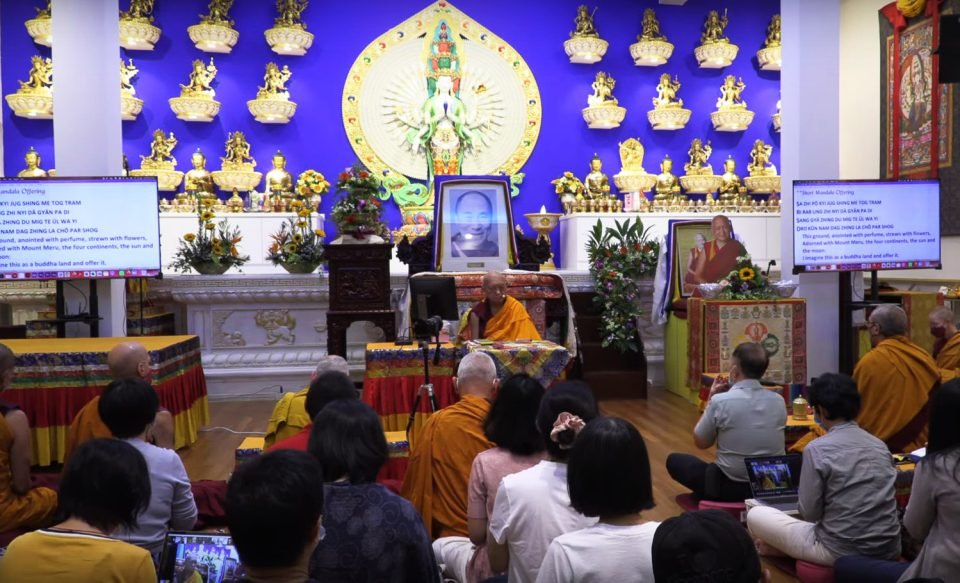
Lama Zopa Rinpoche offering thought transformation teachings at Amitabha Buddhist Centre, Singapore, August 16, 2022.
Lama Zopa Rinpoche continued his video teachings on thought transformation from Amitabha Buddhist Centre in Singapore in August. Here is a summary of the teaching offered on August 16, 2022:
Rinpoche offers some of the history of how he began teaching courses at Kopan Monastery in Nepal and how the FPMT organization began (starting at 28:12 in the video).
Real happiness comes from a good heart, Rinpoche reminds us, not come from the outside. Using the example of Milarepa, who externally had nothing but had incredible realizations and inner peace and happiness, we can see that happiness comes from the mind, not from what we have. Believing that happiness comes from outside, including how much wealth we accumulate, causes great suffering and dissatisfaction, as well as so much worry and fear.
For those of us living as lay couples, Rinpoche advises that we practice the ten virtues together and Rinpoche also suggests practicing the ten Dharma conducts.
We invite you to go deeper into the topics presented here, plus many others, by watching Rinpoche’s video below and reading the full transcript of Rinpoche’s teaching.
Watch Lama Zopa Rinpoche’s teaching “How to Make Your Life Happy”:
- Read the transcript of Rinpoche’s teaching.
- Find Rinpoche’s Teachings on Thought Transformation translated into various languages.
- Dedication verses
Summary of Lama Zopa Rinpoche’s teaching by Carina Rumrill based on the transcript by Ven. Joan Nicell with editorial input and additions by Justin Jenkins. This summary is meant to highlight key topics presented by Rinpoche in the recorded video and is not intended to serve as a full representation of Rinpoche’s teaching, which is best received through watching the video and/or reading the full transcript.
Watch more from the video series Lama Zopa Rinpoche’s Teachings on Thought Transformation and find links to videos in transcripts, MP3s, additional practice advice, and more:
https://fpmt.org/fpmt/announcements/resources-for-coronavirus-pandemic/advice-from-lama-zopa-rinpoche-for-coronavirus/
You can listen to this teaching on our full-length-teachings podcast as well:
https://fpmt.org/media/podcasts/
Lama Zopa Rinpoche is the spiritual director of the Foundation for the Preservation of Mahayana Tradition (FPMT), a Tibetan Buddhist organization dedicated to the transmission of the Mahayana Buddhist tradition and values worldwide through teaching, meditation and community service.
- Tagged: advice from lama zopa rinpoche, coronavirus, lama zopa rinpoche thought transformation video teaching, video
13
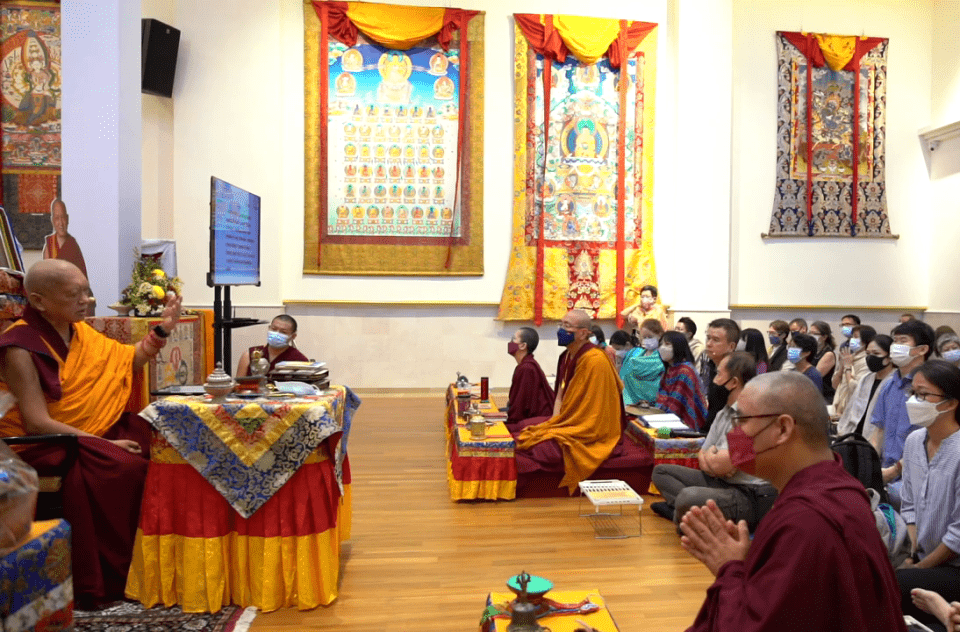
Lama Zopa Rinpoche teaching on the Chokhor Duchen Buddha Day at Amitabha Buddhist Centre, August 1, 2022.
Lama Zopa Rinpoche offered this video teaching during a Lama Chopa puja on Chokhor Duchen, or “Wheel-Turning Day”, August 1, 2022 at Amitabha Buddhist Centre in Singapore. Chokhor Duchen commemorates when Shakyamuni Buddha gave the first teaching after his enlightenment at Deer Park, Sarnath, India. Here is a summary of Rinpoche’s teaching below:
While thanking Amitabha Buddhist Centre members for visiting elderly homes and offering care to the residents, Rinpoche offered some valuable advice about how to be of most benefit when helping the elderly and those facing death (starting at 19:00 in the video and page 4 of the transcript). In this advice Rinpoche mentions several mantras that are particularly beneficial for this purpose.
Rinpoche also discusses the kindness of the Buddha, to commemorate the special Buddha Day of Chokhor Duchen.
Some people don’t think much about the kindness of the Buddha, Rinpoche explains. But without the Buddha, there wouldn’t be teachings, you wouldn’t meet the Dharma in this world. This alone is due to the limitless skies of kindness of the Buddha. The Buddha, with bodhicitta, renounced his own self-cherishing thought and became enlightened. We have not given this up and have followed it from beginningless rebirths, suffering in samsara up to now. With bodhicitta, the Buddha cares for us and loves us a hundred thousand times more than how much we love ourselves. We think we love ourselves but this is nothing compared to how much the Buddha loves and cares for us. Realizing the Buddha’s kindness inspires us
Even a small benefit to sentient beings is an offering to the Buddha because it satisfies and pleases the holy mind. This is an offering to numberless buddhas and bodhisattvas. Likewise, harming any sentient being harms the Buddha because sentient beings are what the Buddha cherishes most. For three countless great eons, the Buddha worked on the path and achieved enlightenment for them, for every insect and every person. If we harm them, we harm numberless buddhas and bodhisattvas. Even offering a kind word or a smile to someone who is worried or afraid can bring so much relief. This is the best offering to numberless buddhas and bodhisattvas.
What pleases the buddhas and bodhisattvas most is not just making extensive, large, beautiful offerings filling the whole city or the sky. It is having compassion for sentient beings. Every sentient being wants happiness and doesn’t want suffering. When we let go of I and cherish others; that is the best offering, the best way to repay the kindness of the Buddha.
We invite you to go deeper into the topics presented here, plus many others, by watching Rinpoche’s video, below.
Watch Lama Zopa Rinpoche’s teaching “The Kindness of the Buddha is Limitless Like the Sky”:
This summary of Lama Zopa Rinpoche’s teaching is by Carina Rumrill, based on the live transcript by Ven. Joan Nicell with additions from Ven. Tenzin Tsomo, with editorial input and additions by Justin Jenkins. This summary is meant to highlight key topics presented by Rinpoche in the recorded video and is not intended to serve as a full representation of Rinpoche’s teaching, which is best received through watching the video and/or reading the full transcript.
Lama Zopa Rinpoche is the spiritual director of the Foundation for the Preservation of Mahayana Tradition (FPMT), a Tibetan Buddhist organization dedicated to the transmission of the Mahayana Buddhist tradition and values worldwide through teaching, meditation and community service.
- Tagged: advice from lama zopa rinpoche, video
12
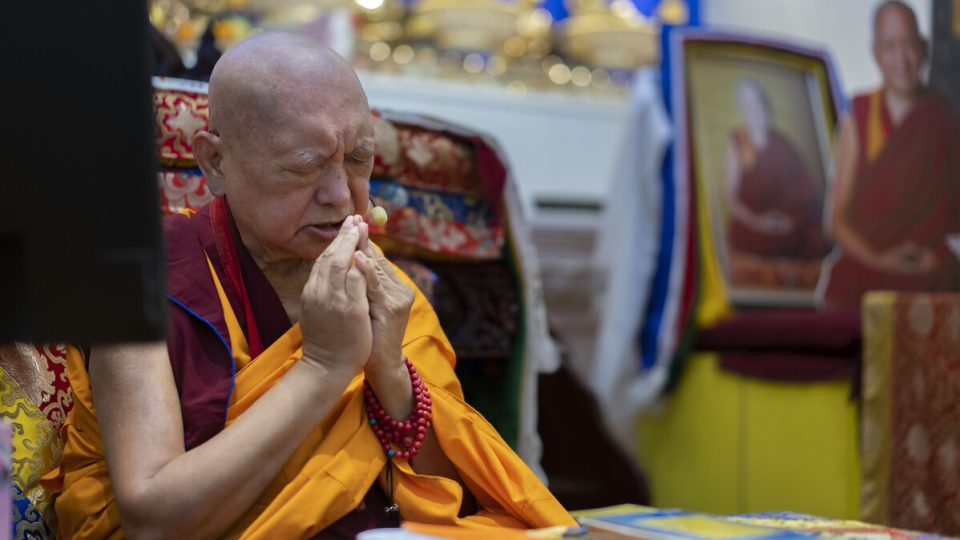
Lama Zopa Rinpoche teaching at Amitabha Buddhist Centre in Singapore, August 14, 2022. Photo by Ven. Lobsang Sherab.
Lama Zopa Rinpoche continued his video teachings on thought transformation from Amitabha Buddhist Centre in Singapore in August. Here is a summary of video #132 in this series, offered on August 14, 2022:
Make your suffering into the best happiness, Rinpoche urges us. All of the pain we face in life came from our mind—our self-cherishing thought with attachment, anger, and ignorance harmed others and now we experience the evolution of that.
So now what do we do? We can use our pain as a cause to achieve enlightenment, not only for ourselves like taking drugs for our benefit alone, but for all sentient beings. This is so important to write down and remember every day. When something undesirable happens, remember this. Whether physical or mental pain—we can make it into the best happiness by enjoying it. Every single suffering of all sentient beings we take onto the path of enlightenment. This makes life so happy. Whenever we see a suffering sentient being we can do this, we can practice tonglen, by sincerely taking on other sentient beings’ suffering and giving our happiness to them in return. Each time we do tonglen, we collect more merit than the sky and become closer and closer to enlightenment, and more and more distant from samsara.
Rinpoche shares a summary of Lama Tsongkhapa’s Advice for Taking Suffering into the Path. First, we must have the wish to dispel suffering, to overcome the mind that suffers. Then, we must take suffering onto the path, to transform suffering into happiness.
The more incapable we are of tolerating suffering, the more we are tormented in life and our minds become increasingly disturbed by hostility. Even a small problem is exaggerated by the mind and made into a big problem, whereby unhappiness increases like torture, and anger arises. By not generating so much concern for our suffering, we become energized, and the mind becomes powerfully strong instead of weak, and we are not so discouraged or tormented. This leads to generating the renunciation of samsara, which leads to total reliance on Buddha, Dharma, and Sangha, who free us and other sentient beings from samsaric suffering. Through seeing the suffering that we experience, we are able to eliminate arrogance and become more careful about creating negative karma and more happy to create virtue. Because of this we are able to generate compassion for others who are also suffering. From compassion, we are able to achieve enlightenment. There is no enlightenment without compassion.
The goal is to experience the suffering of sentient beings so that they become enlightened, free from samsara. While there is pain, death, relationship problems, etc., we experience it for all sentient beings, for them to be free from suffering and achieve enlightenment.
We invite you to go deeper into the topics presented here, plus many others, by watching Rinpoche’s video below and reading the full transcript of Rinpoche’s teaching.
Watch Lama Zopa Rinpoche’s teaching “Whatever Happens in Your Life, Be Happy”:
- Read the transcript of Rinpoche’s teaching.
- Find Rinpoche’s Teachings on Thought Transformation translated into various languages.
- Dedication verses
Summary of Lama Zopa Rinpoche’s teaching by Carina Rumrill based on the transcript by Ven. Joan Nicell with editorial input and additions by Justin Jenkins. This summary is meant to highlight key topics presented by Rinpoche in the recorded video and is not intended to serve as a full representation of Rinpoche’s teaching, which is best received through watching the video and/or reading the full transcript.
Watch more from the video series Lama Zopa Rinpoche’s Teachings on Thought Transformation and find links to videos in transcripts, MP3s, additional practice advice, and more:
https://fpmt.org/fpmt/announcements/resources-for-coronavirus-pandemic/advice-from-lama-zopa-rinpoche-for-coronavirus/
You can listen to this teaching on our full-length-teachings podcast as well:
https://fpmt.org/media/podcasts/
Lama Zopa Rinpoche is the spiritual director of the Foundation for the Preservation of Mahayana Tradition (FPMT), a Tibetan Buddhist organization dedicated to the transmission of the Mahayana Buddhist tradition and values worldwide through teaching, meditation and community service.
- Tagged: advice from lama zopa rinpoche, coronavirus, lama zopa rinpoche thought transformation video teaching, video
8
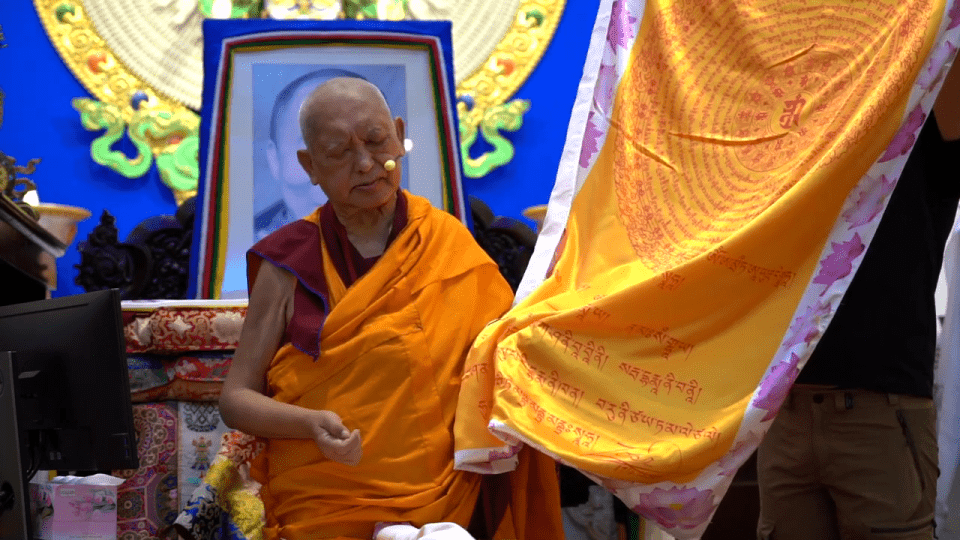
Lama Zopa Rinpoche explaining the benefits of mantras during a thought transformation teaching at Amitabha Buddhist Centre in Singapore, August 13, 2022.
Lama Zopa Rinpoche continued his video teachings on thought transformation from Amitabha Buddhist Centre in Singapore in August. Here is a summary of the teaching offered on August 13, 2022:
To live life as a couple, you need wisdom and compassion, Rinpoche teaches us. If we don’t have this, life together is so much suffering, so many problems. This is due to thinking in the wrong way—with the self-cherishing thought and ignorance, which are the opposite of compassion and wisdom. Depending on how much compassion and wisdom a couple has developed is the degree to which they will be happy or suffer. Each person has to have compassion for the other, and also they must each have the wisdom to see which actions in relation to the other are right or wrong. Otherwise, the relationship is total hallucination.
When we generate compassion, which is the root of holy Dharma, we make others so happy. When we practice loving-kindness toward others, this creates so much good karma, and as a result, others become more compassionate toward us. This goes on from life to life, eons and eons, all the way to enlightenment.
The more you learn Buddhadharma, the more wisdom you develop. To try and help each other, encourage each other to abandon negative karma as much as possible and inspire each other to create good karma. To do this, you can engage in compassionate activities together, helping others.
By training the mind to look at miserable conditions as positive, as happiness, our mental continuum becomes soft rather than violent and concrete. We can become a hero in this way, by training our mind to be soft and gentle. Life stops being so heavy, it becomes very light and healthy—you become a hero of compassion, a hero of bodhicitta. Miserable conditions become auspicious, we can take responsibility and help others, we have no obstacles to our Dharma practice, and our mind is always satisfied and peaceful.
In these degenerative times, we desperately need lojong—thought transformation—where we transform suffering into happiness.
We invite you to go deeper into the topics presented here, plus many others, by watching Rinpoche’s video and read the full transcript of Rinpoche’s teaching.
Watch Lama Zopa Rinpoche’s teaching “The Purpose of Living Life as a Couple”:
- Read the transcript of Rinpoche’s teaching
- Find Rinpoche’s Teachings on Thought Transformation translated into various languages.
- Dedication verses
Summary of Lama Zopa Rinpoche’s teaching by Carina Rumrill based on the transcript by Ven. Joan Nicell with editorial input and additions by Justin Jenkins. This summary is meant to highlight key topics presented by Rinpoche in the recorded video and is not intended to serve as a full representation of Rinpoche’s teaching, which is best received through watching the video and/or reading the full transcript.
Watch more from the video series Lama Zopa Rinpoche’s Teachings on Thought Transformation and find links to videos in transcripts, MP3s, additional practice advice, and more:
https://fpmt.org/fpmt/announcements/resources-for-coronavirus-pandemic/advice-from-lama-zopa-rinpoche-for-coronavirus/
You can listen to this teaching on our full-length-teachings podcast as well:
https://fpmt.org/media/podcasts/
Lama Zopa Rinpoche is the spiritual director of the Foundation for the Preservation of Mahayana Tradition (FPMT), a Tibetan Buddhist organization dedicated to the transmission of the Mahayana Buddhist tradition and values worldwide through teaching, meditation and community service.
- Tagged: advice from lama zopa rinpoche, coronavirus, lama zopa rinpoche thought transformation video teaching, video
7
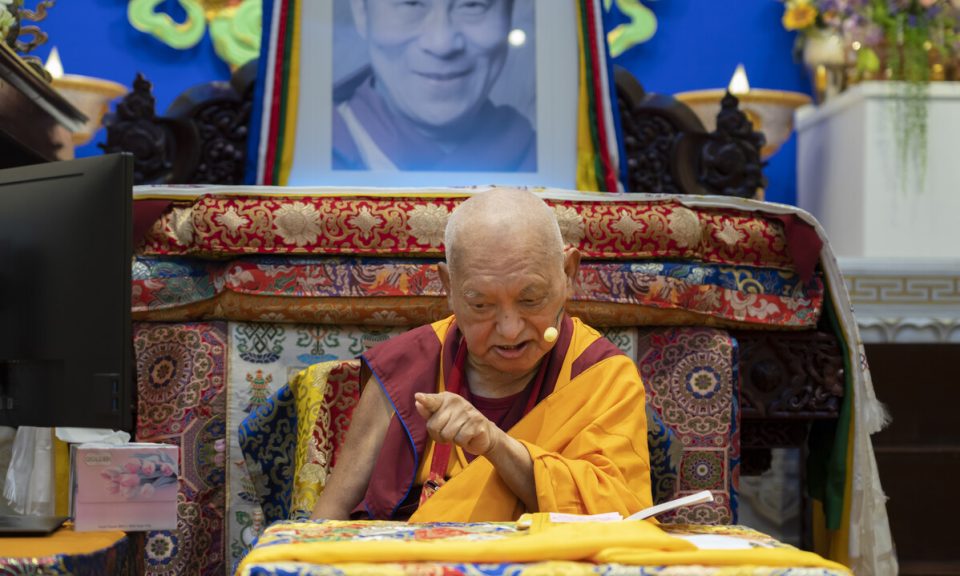
Lama Zopa Rinpoche teaching at Amitabha Buddhist Centre in Singapore, August 10, 2022. Photo by Ven. Lobsang Sherab.
Lama Zopa Rinpoche continued his video teachings on thought transformation from Amitabha Buddhist Centre in Singapore in August. Here is a summary of the teaching offered on August 10, 2022:
The real meaning of life is to benefit others, Rinpoche urges us. And this means everyone—numberless sentient beings, hell beings, numberless hungry ghosts, animals, human beings, sura beings, asura beings, and intermediate state beings— we must stop harming them and instead free them from the oceans of samsaric sufferings. When you generate bodhicitta, no one is left out and whatever you do is for others. Bodhicitta is the best practice.
Samsaric happiness doesn’t last because it is in the nature of suffering. Samara is like a prison—the continuity of rebirth of contaminated aggregates, caused by delusion and karma. This is cyclic existence.
It is very important to understand how anger destroys your happiness. By getting angry at a bodhisattva, our merits are destroyed, we will be reborn in hell, and realizations will be delayed. And by getting angry at a buddha, even more merit is destroyed. Since we cannot tell who is a bodhisattva and who is a buddha, we have to be very, very careful of anger and put so much effort into practicing patience. We can train our mind to practice patience, it gets easier the more we practice. Since anger is the cause of hell suffering, we should stop it. Therefore, motivate every morning to practice patience. Otherwise, anger suddenly arises. You have to prepare yourself with determination to stop it.
We invite you to go deeper into the topics presented here, plus many others, by watching Rinpoche’s video and reading the full transcript of Rinpoche’s teaching.
Watch Lama Zopa Rinpoche’s teaching “Anger Destroys Your Happiness”:
- Read the transcript of Rinpoche’s teaching.
- Find Rinpoche’s Teachings on Thought Transformation translated into various languages.
- Dedication verses
Summary of Lama Zopa Rinpoche’s teaching by Carina Rumrill based on the transcript by Ven. Joan Nicell with editorial input and additions by Justin Jenkins. This summary is meant to highlight key topics presented by Rinpoche in the recorded video and is not intended to serve as a full representation of Rinpoche’s teaching, which is best received through watching the video and/or reading the full transcript.
Watch more from the video series Lama Zopa Rinpoche’s Teachings on Thought Transformation and find links to videos in transcripts, MP3s, additional practice advice, and more:
https://fpmt.org/fpmt/announcements/resources-for-coronavirus-pandemic/advice-from-lama-zopa-rinpoche-for-coronavirus/
You can listen to this teaching on our full-length-teachings podcast as well:
https://fpmt.org/media/podcasts/
Lama Zopa Rinpoche is the spiritual director of the Foundation for the Preservation of Mahayana Tradition (FPMT), a Tibetan Buddhist organization dedicated to the transmission of the Mahayana Buddhist tradition and values worldwide through teaching, meditation and community service.
- Tagged: advice from lama zopa rinpoche, coronavirus, lama zopa rinpoche thought transformation video teaching, video
2
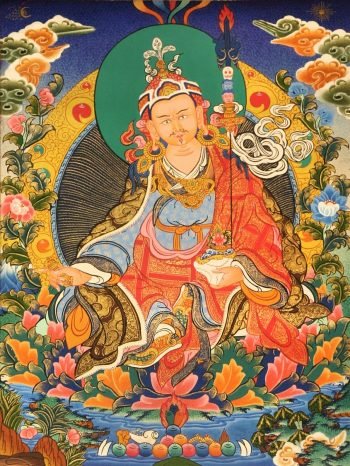
Padmasambhava (also known as Guru Rinpoche).
When the world is in trouble, it can feel very powerless and overwhelming to not know what we can do to actually help. IMI Sangha recently asked Lama Zopa Rinpoche for advice on prayers and practices they could do at this time. We are happy to share this valuable advice with you as well:
- Sampa Lhundrupma
- Recitation of Guru Rinpoche mantra
- Heart Sutra recitation
- Prayer to stop war: Prayer in Accordance with the Times
- Most Secret Hayagriva sadhana (for those who have received the initiation and can do the practice)
- Download compilation: Prayers to Stop War – Prayers 1–3
- Download Prayer in Accordance with the Three Times – Prayer 4.
For those who can do, or sponsor at a monastery, please also do:
- Drugchuma
- Most Secret Hayagriva Tsog Kong*
Lama Zopa Rinpoche’s advice for how to motivate and think when doing these prayers and practices:
At the beginning generate strong bodhicitta, then do these prayers and practices to stop the war between Russia and Ukraine. The main purpose is to stop the war immediately. Then also to prevent famine, disease, and all the dangers of earth, water, fire, and wind, for all these dangers to be pacified immediately. To fill the whole world with perfect peace and happiness, including enlightenment, and to generate loving kindness, compassion and bodhicitta in the heart of all sentient beings, especially in that of the President of Russia.
Think that from Guru Padmasambhava’s heart, beams radiate and totally purify all the six realms’ sentient beings, totally purify all the delusions and negative karmas collected from beginningless rebirths, especially anger, attachment, and ignorance; think that these are totally purified. Then recite Sampa Lhundrupma, followed by the Padmasambhava mantra (one or two malas).
With strong faith in Guru Padmasambhava and total reliance, Guru Padmasambhava will definitely help because his compassion embraces all sentient beings.
Then another way to think is, with strong faith in His Holiness the Dalai Lama in the aspect or Guru Padmasambhava, nectar beams are emitted to the Russian President and enter his body, and totally purify all his negative karma and obscurations; all the dissatisfied mind, desire, ignorance, anger, and selfish mind are totally purified; he generates bodhicitta especially, and then the whole path to enlightenment. Do that very strongly, making strong prayers to His Holiness the Dalai Lama.
Then nectar beams are also emitted to all the Russian and Ukrainian armies, and these purify all the anger and self-cherishing thought on both sides, but mainly President Putin’s. They generate bodhicitta, and stop giving harm to even one sentient being and only benefit sentient beings, up to enlightenment.
Then recite the Heart Sutra and the prayer to stop wars.
For those who can do the Most Secret Hayagriva sadhana, do this at the beginning of the practice. When reciting the mantra, you can do the same visualizations as above, and think President Putin’s mind is totally changed and he generates bodhicitta.
* Please note that a Most Secret Hayagriva Puja, led by Lama Zopa Rinpoche will be held at Amitabha Buddhist Centre (ABC) on September 4, 2022. All are welcome to join this puja online, details can be found on ABC’s Facebook page. One can also help sponsor this puja, in accordance with Rinpoche’s advice above.
Valuable and timely advice from Lama Zopa Rinpoche can be found on Rinpoche’s advice page.
Lama Zopa Rinpoche is the spiritual director of the Foundation for the Preservation of Mahayana Tradition (FPMT), a Tibetan Buddhist organization dedicated to the transmission of the Mahayana Buddhist tradition and values worldwide through teaching, meditation and community service.
- Tagged: advice from lama zopa rinpoche, peace
25
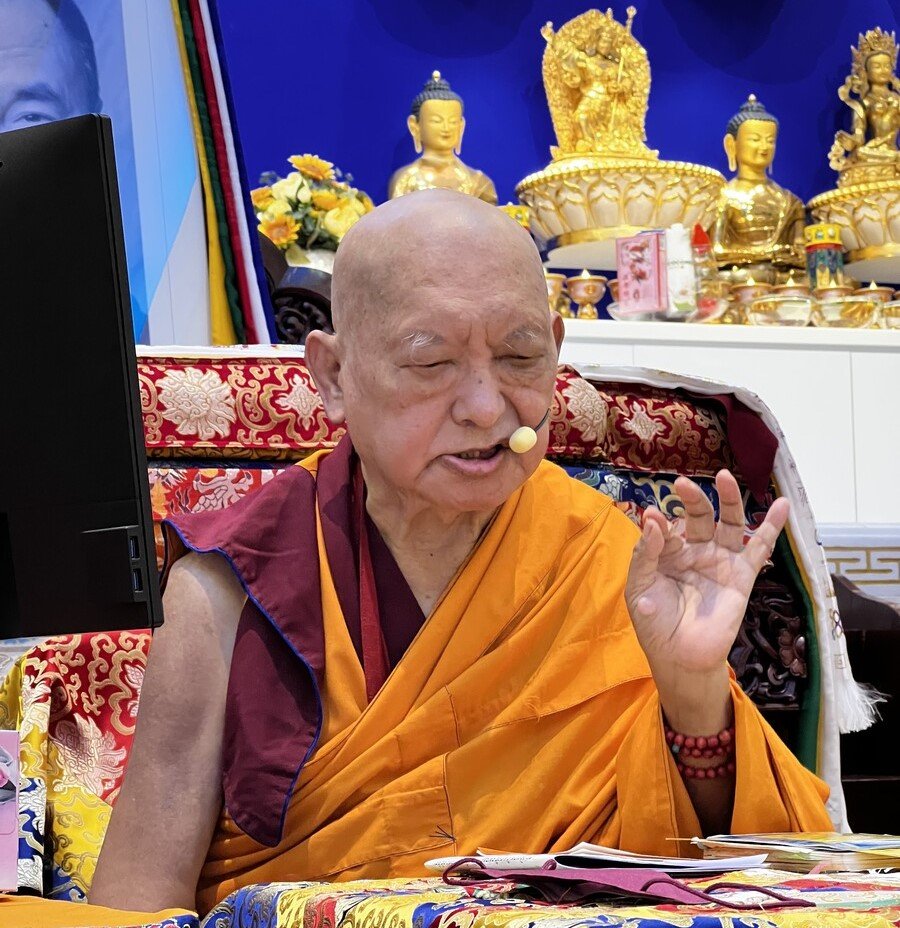
Lama Zopa Rinpoche teaching at Amitabha Buddhist Centre, Singapore, August 2022.
Lama Zopa Rinpoche offered this teaching on August 7, 2022 to elders who attend Chinese-language Sunday morning talks with Khen Rinpoche Geshe Chonyi at Amitabha Buddhist Centre, Singapore. This is excellent universal advice for students young and old! Here’s a summary of Rinpoche’s teaching. You can find the video of the teaching and a link to the transcript below.
With this human rebirth, we can be happy day and night and bring others to the different levels of happiness as well, Rinpoche reminds us. Every morning, afternoon, and every evening, we should rejoice in our human rebirth. We are so fortunate, there’s no place in the mind for depression.
Many of us worry, as death approaches, that we will be separated from our family when we die. Because of our strong connection, we will meet with family members again in future lives, so there is actually nothing to worry about. Everything you think you will miss in this life is much better in a pure land and there is no suffering at all! We cause suffering to ourselves by grasping like this to our family, our possessions, our body, so let go. We free ourselves from attachment clinging to the family.
Especially when we know we are dying, we must not cling to enjoyments of this life, to our possessions, property, and family. If we cling, then there is worry and fear. Instead, rely on Chenrezig, the buddha of compassion. Chrenrezig has the power to guide you to peerless happiness and has compassion for every sentient being.
Rinpoche offers the oral transmissions of several mantras (39:16 in the video): The Holy Name and Mantra of Guru Shakyamuni Buddha, Amitabha Mantra, Medicine Buddha Mantra, Tara Mantra, Manjushri Mantra, Long and Short Mantras of Thousand-Armed Chenrezig, Long and Short Mantras of Vajrasattva.
We invite you to go deeper into the topics presented here, plus many others, by watching Rinpoche’s video and reading the full transcript of Rinpoche’s teaching.
Watch Lama Zopa Rinpoche’s teaching “With This Human Rebirth, You Can Be Happy Day and Night”:
Read the transcript of Rinpoche’s teaching.
This summary of Lama Zopa Rinpoche’s teaching is by Carina Rumrill, based on the live transcript by Ven. Joan Nicell and checked by Laura Haughey, with editorial input and additions by Justin Jenkins. This summary is meant to highlight key topics presented by Rinpoche in the recorded video and is not intended to serve as a full representation of Rinpoche’s teaching, which is best received through watching the video and/or reading the full transcript.
You can find PDF and audio files of mantras through the Foundation Store.
Lama Zopa Rinpoche is the spiritual director of the Foundation for the Preservation of Mahayana Tradition (FPMT), a Tibetan Buddhist organization dedicated to the transmission of the Mahayana Buddhist tradition and values worldwide through teaching, meditation and community service.
- Tagged: advice from lama zopa rinpoche, video
19
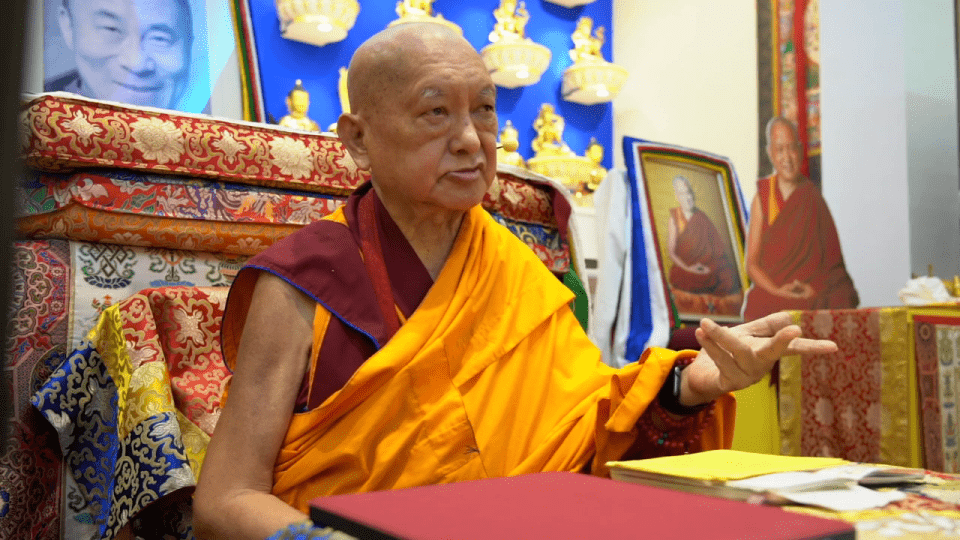
Lama Zopa Rinpoche giving thought transformation teachings at Amitabha Buddhist Centre, Singapore, August 6, 2022.
Lama Zopa Rinpoche continues his video teachings on thought transformation from Amitabha Buddhist Centre in Singapore at the request of Telo Tulku Rinpoche, Ganden Tendar Ling FPMT Buddhist Center, Aryadeva FPMT Study Group, and the Save Tibet Foundation in Russia. Here is a summary of his August 6, 2022 teaching:
Most of the world is suffering, Rinpoche reminds us. Whether rich or poor, there is suffering from disease; dangers of the elements such as earthquakes, floods, or fires; violence—the suffering of samsara is constant. Even science cannot stop these dangers. Dharma is the only way to be free from all of these sufferings by purifying the mind which is the cause. Our happiness and suffering depend on how we think, and Dharma is medicine for the mind.
The definition of Dharma, according to the Kadampa geshes, is any action of body, speech, or mind that becomes an antidote to delusions. Dharma is anything that benefits, that brings happiness beyond this life up to enlightenment. Until we are free from samsara, we need happiness in all future lives.
Practicing patience and compassion are antidotes to suffering. Giving without an expectation of a reward or recognition is pure Dharma. The bodhisattva attitude is to serve others—always having the wish to be useful to sentient beings for their happiness. If we want happiness for ourselves, we should be good human beings, and to be good human beings, we must become Dharma. If the purpose of our life is to cause happiness to others, the result is we will be happy ourselves. Treating others with loving-kindness and compassion brings them happiness. Giving up our own happiness so that others can have happiness enables us to experience success from life to life.
Rinpoche explains three reasons to practice Dharma:
- Practice Dharma for yourself to not be reborn in the lower realms
- Practice Dharma to achieve the blissful state of peace for yourself
- Practice Dharma to achieve the great nirvana
The real practice is the ultimate good heart, bodhicitta. This is what the whole lamrim is about. This is what sutra and tantra are about. Whether one has memorized hundreds of volumes of scripture, or knows one mantra, the real practice is bodhicitta.
We invite you to go deeper into the topics presented here, plus many others, by watching Rinpoche’s video and reading the full transcript of Rinpoche’s teaching.
Watch Lama Zopa Rinpoche’s teaching “Dharma Is Any Action That Becomes an Antidote to Delusion”:
- Read the transcript of Rinpoche’s teaching
- Find Rinpoche’s Teachings on Thought Transformation translated into various languages.
- Dedication verses
Summary of Lama Zopa Rinpoche’s teaching by Carina Rumrill based on the transcript by Ven. Joan Nicell with editorial input and additions by Justin Jenkins. This summary is meant to highlight key topics presented by Rinpoche in the recorded video and is not intended to serve as a full representation of Rinpoche’s teaching, which is best received through watching the video and/or reading the full transcript.
Watch more from the video series Lama Zopa Rinpoche’s Teachings on Thought Transformation and find links to videos in transcripts, MP3s, additional practice advice, and more:
https://fpmt.org/fpmt/announcements/resources-for-coronavirus-pandemic/advice-from-lama-zopa-rinpoche-for-coronavirus/
You can listen to this teaching on our full-length-teachings podcast as well:
https://fpmt.org/media/podcasts/
Lama Zopa Rinpoche is the spiritual director of the Foundation for the Preservation of Mahayana Tradition (FPMT), a Tibetan Buddhist organization dedicated to the transmission of the Mahayana Buddhist tradition and values worldwide through teaching, meditation and community service.
- Tagged: advice from lama zopa rinpoche, coronavirus, lama zopa rinpoche thought transformation video teaching, video
12
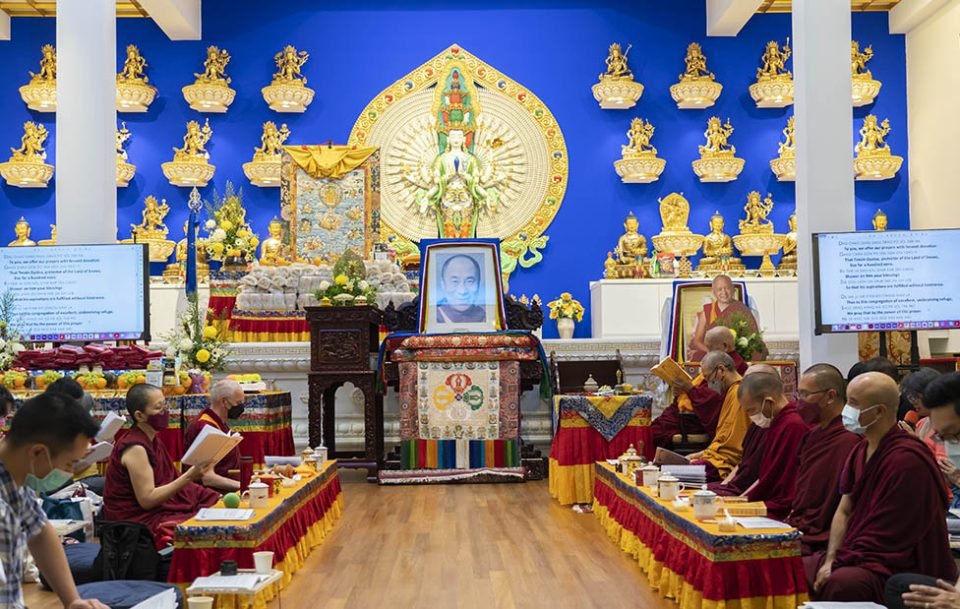
Lama Zopa Rinpoche leading a Guru Puja in celebration of His Holiness the Dalai Lama’s birthday, July 6, 2022, in Singapore. Photo by Ven. Lobsang Sherab.
A few hours after his discharge from a hospital in Singapore for a medical procedure, Lama Zopa Rinpoche joined the Amitabha Buddhist Centre (ABC) community in Singapore for their special celebration of His Holiness the Dalai Lama’s 87th birthday on July 6, 2022. Rinpoche offered incredibly powerful and precious words about His Holiness’s qualities, guru devotion, and impermanence.
“Definitely in your heart, rely on His Holiness and often do requests,” Rinpoche advises us. “Request the success of realizations and to grant blessings in your heart and to bless your heart to transform it into the path to enlightenment. As His Holiness often emphasizes, bodhicitta and emptiness. Often when he talks, every time, that is kind of the basis, the foundation. So you practice like that from your heart. From your side, you rely on him, you request and rely on His Holiness, then definitely from His Holiness’s side, definitely he will all the time guide you from life to life, up to enlightenment.”
“You might think His Holiness is not there,” Rinpoche explained, “But in reality, His Holiness is there. You have to know that. His Holiness sees you all the time. His Holiness sees you day and night. Whatever you are doing, His Holiness sees you all the time. Because the past numberless buddhas, present numberless buddhas, and future numberless buddhas see you all the time, without break even for a second, never distracted away from that, even for a second.”
We invite you to watch and hear the full message Rinpoche offered on His Holiness’s birthday.
We have many practices related to His Holiness the Dalai Lama, compiled recently for celebrations of His Holiness around the world:
fpmt.org/edu-news/practice-resources-for-celebrating-his-holiness-the-dalai-lamas-birthday
Lama Zopa Rinpoche is the spiritual director of the Foundation for the Preservation of Mahayana Tradition (FPMT), a Tibetan Buddhist organization dedicated to the transmission of the Mahayana Buddhist tradition and values worldwide through teaching, meditation and community service.
- Home
- News/Media
- Study & Practice
- About FPMT Education Services
- Latest News
- Programs
- New to Buddhism?
- Buddhist Mind Science: Activating Your Potential
- Heart Advice for Death and Dying
- Discovering Buddhism
- Living in the Path
- Exploring Buddhism
- FPMT Basic Program
- FPMT Masters Program
- FPMT In-Depth Meditation Training
- Maitripa College
- Lotsawa Rinchen Zangpo Translator Program
- Universal Education for Compassion & Wisdom
- Online Learning Center
- Prayers & Practice Materials
- Overview of Prayers & Practices
- Full Catalogue of Prayers & Practice Materials
- Explore Popular Topics
- Benefiting Animals
- Chenrezig Resources
- Death & Dying Resources
- Lama Chopa (Guru Puja)
- Lama Zopa Rinpoche: Compendium of Precious Instructions
- Lama Zopa Rinpoche: Life Practice Advice
- Lama Zopa Rinpoche Practice Series
- Lamrim Resources
- Mantras
- Prayer Book Updates
- Purification Practices
- Sutras
- Thought Transformation (Lojong)
- Audio Materials
- Dharma Dates – Tibetan Calendar
- Translation Services
- Publishing Services
- Teachings and Advice
- Find Teachings and Advice
- Lama Zopa Rinpoche Advice Page
- Lama Zopa Rinpoche: Compendium of Precious Instructions
- Lama Zopa Rinpoche Video Teachings
- ༧སྐྱབས་རྗེ་བཟོད་པ་རིན་པོ་ཆེ་མཆོག་ནས་སྩལ་བའི་བཀའ་སློབ་བརྙན་འཕྲིན།
- Podcasts
- Lama Yeshe Wisdom Archive
- Buddhism FAQ
- Dharma for Young People
- Resources on Holy Objects
- Ways to Offer Support
- Centers
- Affiliates Area
- Teachers
- Projects
- Charitable Projects
- Make a Donation
- Applying for Grants
- News about Projects
- Other Projects within FPMT
- Support International Office
- Projects Photo Galleries
- Give Where Most Needed
- FPMT
- Shop
Translate*
*powered by Google TranslateTranslation of pages on fpmt.org is performed by Google Translate, a third party service which FPMT has no control over. The service provides automated computer translations that are only an approximation of the websites' original content. The translations should not be considered exact and only used as a rough guide.It is important to understand that true practice is something we do from moment to moment, from day to day. We do whatever we can, with whatever wisdom we have, and dedicate it all to the benefit of others. We just live our life simply, to the best of our ability.







